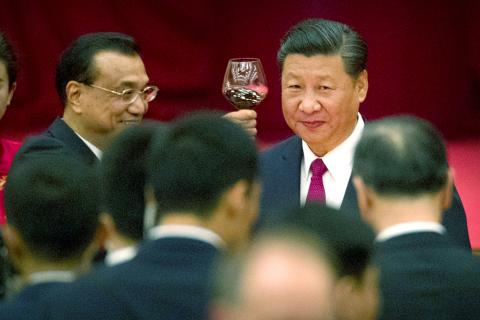Chinese President Xi Jinping (習近平) might introduce a deadline for a resolution on Taiwan during the 19th National Congress of the Communist Party of China this month, according to former American Institute in Taiwan (AIT) chairman Richard Bush.
In a blog post titled “What will Xi Jinping say about Taiwan at the 19th Party Congress?” Bush wrote that Xi might introduce new elements in China’s position on Taiwan, such as a deadline for a solution to what Beijing calls the “Taiwan issue.”
“One possibility here is conveying a sense of urgency about resolving the dispute with Taiwan or even setting a deadline,” wrote Bush, who was AIT chairman from 1997 to 2002 and now serves as codirector of the Center for East Asia Policy Studies at the Brookings Institution.

Photo: AP
Xi had hinted in a meeting in 2013 with former vice president Vincent Siew (蕭萬長) that “settling the dispute could not be postponed from generation to generation,” Bush said.
If Xi wants to reaffirm China’s policy on Taiwan, he would simply repeat common elements in speeches leaders had made at past party congresses, such as the guiding principle of peaceful unification, he said.
However, if Xi does toughen Beijing’s Taiwan policy, for example by not restating the peaceful unification principle, “it would widen China’s options in a coercive direction,” Bush said.
It would suggest that China “would be willing to impose a solution rather than negotiate one on a mutually acceptable basis,” he wrote.
Former AIT director Douglas Paal said he believes that Beijing will likely take a low-key approach on Taiwan at the party congress, which is scheduled to begin on Oct. 18.
Paal, speaking in a panel previewing the congress in Washington on Friday, said his unofficial sources in Beijing told him that no tough talk on Taiwan is expected from the Chinese leader.
Commenting on the possibility of a “fourth US-China communique” emerging from an upcoming meeting between Xi and US President Donald Trump, who is to tour five Asian nations next month, Paal said it was highly unlikely to happen.
The question of a fourth joint communique, which would follow the three communiques on Taiwan that the US and China issued between 1972 and 1982, arose in a report in the Taiwan-based Chinese-language Liberty Times (sister newspaper of the Taipei Times) published earlier this year.
The report, citing an unnamed source, said that former US secretary of state Henry Kissinger was trying to get the two nations to sign such a document.
Paal, who is vice president for studies at the Carnegie Endowment for International Peace, said he expects Washington to continue to show its support for Taiwan based on the US’ Taiwan Relations Act and would not sign a fourth communique.

An essay competition jointly organized by a local writing society and a publisher affiliated with the Chinese Communist Party (CCP) might have contravened the Act Governing Relations Between the People of the Taiwan Area and the Mainland Area (臺灣地區與大陸地區人民關係條例), the Mainland Affairs Council (MAC) said on Thursday. “In this case, the partner organization is clearly an agency under the CCP’s Fujian Provincial Committee,” MAC Deputy Minister and spokesperson Liang Wen-chieh (梁文傑) said at a news briefing in Taipei. “It also involves bringing Taiwanese students to China with all-expenses-paid arrangements to attend award ceremonies and camps,” Liang said. Those two “characteristics” are typically sufficient

A magnitude 5.9 earthquake that struck about 33km off the coast of Hualien City was the "main shock" in a series of quakes in the area, with aftershocks expected over the next three days, the Central Weather Administration (CWA) said yesterday. Prior to the magnitude 5.9 quake shaking most of Taiwan at 6:53pm yesterday, six other earthquakes stronger than a magnitude of 4, starting with a magnitude 5.5 quake at 6:09pm, occurred in the area. CWA Seismological Center Director Wu Chien-fu (吳健富) confirmed that the quakes were all part of the same series and that the magnitude 5.5 temblor was

The brilliant blue waters, thick foliage and bucolic atmosphere on this seemingly idyllic archipelago deep in the Pacific Ocean belie the key role it now plays in a titanic geopolitical struggle. Palau is again on the front line as China, and the US and its allies prepare their forces in an intensifying contest for control over the Asia-Pacific region. The democratic nation of just 17,000 people hosts US-controlled airstrips and soon-to-be-completed radar installations that the US military describes as “critical” to monitoring vast swathes of water and airspace. It is also a key piece of the second island chain, a string of

The Central Weather Administration has issued a heat alert for southeastern Taiwan, warning of temperatures as high as 36°C today, while alerting some coastal areas of strong winds later in the day. Kaohsiung’s Neimen District (內門) and Pingtung County’s Neipu Township (內埔) are under an orange heat alert, which warns of temperatures as high as 36°C for three consecutive days, the CWA said, citing southwest winds. The heat would also extend to Tainan’s Nansi (楠西) and Yujing (玉井) districts, as well as Pingtung’s Gaoshu (高樹), Yanpu (鹽埔) and Majia (瑪家) townships, it said, forecasting highs of up to 36°C in those areas